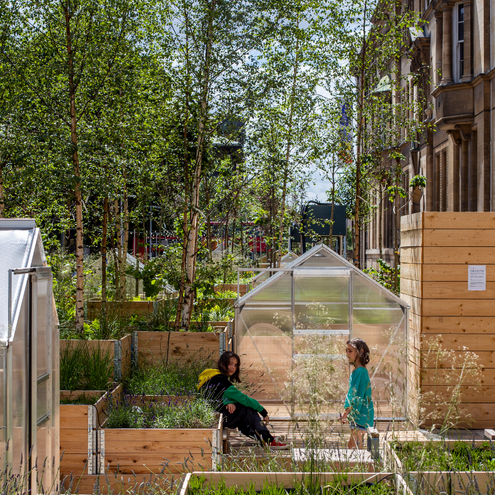Project showcase
The Spark Lab, Ilford – Redbridge Council with Jan Kattein Architects

Affordable creative work spaces for 7 businesses and community organisations are arranged across two adjacent sites in this development of a disused retail space. After the end of the Spark Lab tenure, a legacy project will continue to green Ilford’s centre with plans to plant 80 trees.
Who is on the project team?
Jan Kattein Architects, Things Made Public.
Describe the context of this project and its neighbourhood and people?
Whilst town centres nationwide have been trying to assert themselves against the relentless advance of online retail, Ilford is confidently re-inventing itself. Pedestrianisation, new planting, seating and incidental play has comprehensively transformed the high street. A new street food market and urban rooftop farm, Mercato Ilford is shortly to be launched on a disused car park. Redbridge town hall has been taken over by Spacestudios, an organisation providing artists’ workspace. A street art gallery has sprung up to adorn blank building facades. And a new modular homeless shelter complete with training workshop provides accommodation and support for rough sleepers.
Our project occupies two adjacent sites, the disused premises of a former Debenhams in a key location in the town centre and Oakfield Road, a connecting link between Mercato, the Kenneth More Theatre, Spacestudios and Ilford Library.
Ilford is seeing significant regeneration in connection with its’ designation as a housing zone and the arrival of the Elizabeth Line. Redbridge Council has partnered with the private sector to deliver over 700 new homes locally. Spark Lab forms part of the Council’s efforts to build capacity and to leverage opportunities for local communities and businesses, providing the civic infra structure needed to accommodate the anticipated influx of residents and visitors to the area.
The project was conceived in close dialogue with local organisations and institutions forming part of the Cultural Consortium, an organisation set up specifically to promote and steer the transformation of the town centre into a cultural destination.
Tell us what you did and how the project, event or installation enlivened the place in a creative way?
Together with urban events company Things Made Public, we have developed a two-pronged strategy to complete the transformation and help launch Ilford Town Center as a key cultural destination on the north-eastern fringe of the capital.
The Spark Lab takes up the ground floor of a vacant department store to provide incubation space for cultural organisations and local businesses with a public purpose wanting to trial a high street presence. Modular furniture, lighting and adaptable displays can be deployed in multiple configurations to suit a range of uses.
Wilderness Street is the title for a temporary living urban landscape to be installed in the town center, adjacent to the Lab. We identified Oakfield Road as a key artery that binds together Ilford’s most important cultural venues and the high street.
Before large-scale urbanisation started from the C19, the Ilford, Barkingside and Hainault area was characterised by forests, fields and meadows. Our design strategy seeks to temporarily revive these lost landscapes. We have selected Uphall Camp Beacon, the former Royal Forest of Hainault and the Essex Grazing Marshes as blueprints for plant species and landscape character to be replicated by our proposal for Oakfield Road.
The project advocates for the preservation of ancient natural landscapes and their role in maintaining biodiversity and supporting well-being. A series of community events and workshops around the theme of landscape including planting workshops were programmed for the duration of the project.
How did you engage the community?
Spark Lab is providing a bursary and prime location incubator space for 7 businesses and community organisations. It has activated 400 sq/m of disused retail space. Wilderness Street has transformed 1000 sq/m of public space. With its scale and prominent location in the town center, we estimate that 5.2m visitors will experience the project during its’ 6 months lifetime (based on visitor numbers to the Ilford Exchange, the entrance of which is opposite the project location). As part of its’ legacy strategy and at the end of its’ tenure on the meanwhile site the project will see 80 indigenous trees and nearly as many shrubs and small plants permanently planted on sites in and around the town centre. Public workshops have engaged hundreds of young people and families around themes of ecology/planting, creativity, high street regeneration. Partnerships established with business-, cultural- and educational organisations established through the project will drive town center transformation and management beyond the project duration.
Did the project make a positive social and environmental contribution?
From an environmental, health and Ilford town centre ranks amongst the 10 - 20% most deprived areas in England in terms of its’ living environment.
Wilderness Street is a unique response to challenges associated with low air quality, traffic dominance and access to green space. The project responds fourfold.
1.At the advent of the high street pedestrianisation, Wilderness Street acts as a campaign tool. It sets a lived example of what can be achieved in town centres when vehicles are removed and pedestrians take precedent. The project inspires a more active lifestyle of walking and cycling and it puts the experience of nature into the heart of the town centre.
2.Our design strategy temporarily revives lost landscapes. We have selected Uphall Camp Beacon, the former Royal Forest of Hainault and the Essex Grazing Marshes as blueprints for plant species and landscape character replicated in Oakfield Road. These specific local references instil a sense of belonging and civic pride amongst residents.
3.Wilderness Street is an immersive greenspace offering a multi-sensual experience for people of all ages and social- and economic backgrounds. Nature has been demonstrated to significantly contribute to mental well-being. In the context of local environmental deficiencies, the project demonstrates notable benefits. Workshops and engagement events and the spatial configuration encourage social exchange and inter-action, mitigating the effects of loneliness and isolation.
4.The legacy strategy will see trees re-planted in parks, public spaces and gardens to secure long-term benefits in terms of combating the effects of climate change and improvements to air quality.
Festival of Pineapples
24-26 February 2026
Pineapples prize giving night
April
Pineapples at Festival of Place
10 June 2026
© The Pineapples - Tweak Ltd. 124 City Road, London, EC1V 2NX. Tel: 020 3326 7238




